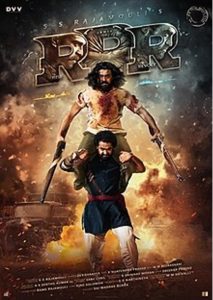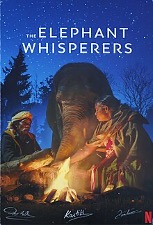I’ve enjoyed immersing myself in the local media and it’s an easy way of familiarising myself with India. Luckily loads of material is available in English, making it very easy. Here are the things I’ve stumbled across to help me get acquainted.
Films
I’m not a big consumer of Indian movies so I’ve gone for two recent box office hits which are streaming so easy to locate.
 RRR (Rise, Roar, Revolt) – was India’s top-grossing film in 2022. It’s basically a team-up of two badasses, one a tribal villager avenging the abduction of a young girl by the British governor’s wife. The other, seemingly a local British police officer, is revealed to be another irate Indian wanting to avenge the genocide of his village by the evil Brits. It was apparently inspired by Inglorious Basterds and is if anything even more violent.
RRR (Rise, Roar, Revolt) – was India’s top-grossing film in 2022. It’s basically a team-up of two badasses, one a tribal villager avenging the abduction of a young girl by the British governor’s wife. The other, seemingly a local British police officer, is revealed to be another irate Indian wanting to avenge the genocide of his village by the evil Brits. It was apparently inspired by Inglorious Basterds and is if anything even more violent.
Pathaan – a Mission Impossible-style vehicle for the ubiquitous Shah Rukh Khan who plays a disgraced RAW agent (India’s CIA). There is an unlikely partnership/relationship between a Khan and an ISS agent (Deepika Padukone) to fight off a smallpox armageddon from the bad guy. Great fun.
TV shows
There are some really good Indian shows streaming on Netflix and Prime. My two favourites touch the vast gulf between the urban elite and the rural majority.
Panchayat: A bitter-sweet comedy about a metropolitan engineering graduate who takes a job as an official in a remote village while studying for entry to a prestigious university. It’s a gentle satire on rural politics. He works for the local Pradhan (village mayor) and feuds with the imperious MLA to pull resources into the village to build latrines, pave the road and sort out trifling disputes.
Decoupled: is a hilarious account of a collapsing marriage between two Delhi hi-flyers, writer Arya and his financier wife Shruti, who decide to continue living together for their daughter. Arya’s arrogance and outspokenness constantly get him into trouble, and Shruti delights in deflating his massive ego. In one episode, their disgruntled driver tired of their condescension abandons them and returns to his village. When our couple goes to the sticks to retrieve him, they are so unknowing of local customs, they almost get lynched. The finale episode was shot in Goa just a short walk from where we live.
Documentaries
 The Elephant Whisperers is an Oscar-winning documentary about two south Indian tribals in Tamil Nadu who foster orphaned elephants Raghu and then Ammukuttu raising them from infancy. The outdoor photography is beautiful, and the bond between humans and elephants is so strong it’s impossible not to feel the wrench when the elephants are rehoused by the forestry service (their employer). The film gives some idea of the resources the national and state forestry service pours into Indian nature conservation – around a fifth of India is designated as forest including reserves for tigers, desert species, and mangroves.
The Elephant Whisperers is an Oscar-winning documentary about two south Indian tribals in Tamil Nadu who foster orphaned elephants Raghu and then Ammukuttu raising them from infancy. The outdoor photography is beautiful, and the bond between humans and elephants is so strong it’s impossible not to feel the wrench when the elephants are rehoused by the forestry service (their employer). The film gives some idea of the resources the national and state forestry service pours into Indian nature conservation – around a fifth of India is designated as forest including reserves for tigers, desert species, and mangroves.
Saxtticho Koddo (The Granary of Salcete) is a short film about Goa’s rice farming culture chronicling the ceremonies, songs and dances that predate the arrival of the Portuguese. High rice yields were maintained for many generations by the collectively organised creation of canals and terraces, which represent human endeavour equivalent to building the Grand Pyramid many times over. Farmers had a repertoire of rice cultivars for local palates and to combat pests and disease. Now few young Goans, especially once educated, wish to remain in the fields. The film mentions intermediate technology inventions to semi-automate the back-breaking planting and harvesting of rice seedlings in the tiny plots, and the arrival of more middle-class lifestyle farmers into the countryside.
Novels
I liked Chetan Bhagat’s Nick Hornby-esque One night @ the call centre (2005). The title’s a bit of a giveaway. Still, if you’ve ever wondered about the lives and ambitions of Hari and Sacha on the other end of the helpline, this book gives a cheerful account of the five staff taking advantage of a computer hitch during their shift to motivate one another to pursue their real passions. Bhagat’s first novel, which covered the stresses of India’s famously competitive but creativity-destroying Indian Institute of Management course, was adapted into the famous movie 3 Idiots.
A complete antidote to Bhagat’s slushy silliness is Deepti Kapoor recent crime saga Age of Vice (2023). This literary state-of the-nation is set in Delhi, Uttar Pradesh, Goa has a cast of mafia, journalists, politicians and idealists. The accounts of the character’s dissolute destruction are painful to read, especially since much of the suffering is dished out on princeling hero Sonny by his crime-overlord father. His crime was plotting to redeploy the family’s ill-gotten wealth to transform Delhi rather than just accumulate. Netflix has bought the rights to the book.
Podcasts
Given the amount of Indian Youtubers, I’ve found it hard to find a good local Indian podcast. Maybe it’s the clampdown on independent journalists. Both my picks are supported by USA endowments but hosted by Indian journalists.
Grand Tamasha (big fuss in English) is hosted by Milan Vaishnav (based out of George Town) and supported by the Carnegie Foundation. Every week it spends an hour interviewing authors of major new books or creatives. I picked up a lot of book suggestions from this.
Ideas of India is hosted by economist George Mason University-based economist Shruti Rajagopalan. As the title suggests every two weeks, she interviews some of the smartest thinkers usually, but not exclusively from India, ranging from central bank governors (Dr C. Rangarajan) to spatial planners (French World Bank consultant Alain Bertaud). These aren’t interviews, these are proper discussions with Shruti debating their evidence and offering her own libertine insights.
Non-fiction
I’ve picked up a lot of non-fiction books about recent Indian affairs but there’s only one I can wholeheartedly recommend.
India After Gandhi by Ramachandra Guha is a 944-page political and social treatise. The third edition covers the period between Independence and finishes with Prime Minister Modi’s handling of COVID. It’s a wonderful book, with warts and all, treatments of the major political figures and their major pollical challenges, religious and linguistic schisms. Reading it you start to appreciate the formidable challenge Nehru and his able deputy Vallabhbhai Patel faced creating a secular, democratic country from the bloody disintegration of the sub-continent and the integration of the nominally independent princely states (which accounted for a third of India’s area). It’s hard living in the West to appreciate how fractious relationships have been with neighbours (four wars with Pakistan including one to create Bangladesh, two with China) a skirmish with Portugal to liberate Goa. The economy has switched from a highly nationalised ‘socialistic’ state, a deliberately ambiguous term adopted by Nehru, which his daughter Indira Gandhi extended to the slow economic liberalisation started by Naramsimha Rao which continued under Congress and BJP to this day.
I’d love to hear further suggestions in the comments.
